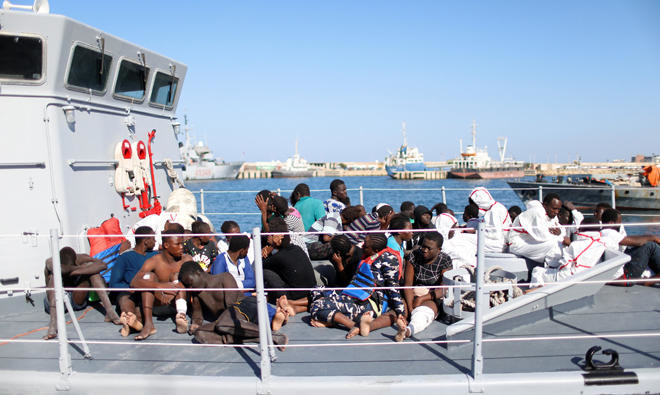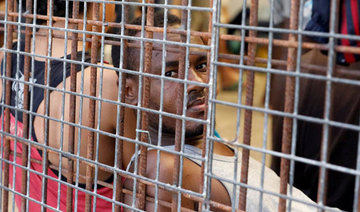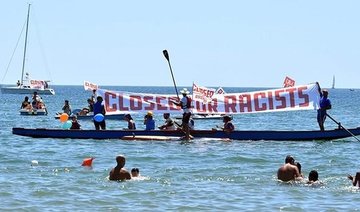CAIRO: Providing resettlement options for illegal migrants trying to reach Europe is unacceptable for many Libyans and could further aggravate the civil conflict there, Libyan sources have said.
However, these sources warned that some warring parties may, for political or financial gains, exploit any proposal to provide migrants and refugees with resettlement options.
Ministers and representatives from 13 European and African countries met on Monday in Bern, Switzerland, to discuss ways to deter illegal immigration, especially through Libya; they also called for improved resettlement options for refugees along the migration route.
“The Libyans fear that Europe will seek to solve its migrant crisis at Libya’s expense through taking advantage of the absence of security and authority in many Libyan territories to provide options that range from establishing camps for detaining or sheltering refugees to resettlement, especially in southern Libya,” said a Libyan media source linked to the illegal immigration issue whose name was withheld for security reasons.
In September 2017, the UN High Commissioner for Refugees (UNHCR) urgently called for resettlement places for 40,000 of the most vulnerable migrants and refugees stranded in 15 countries along the so-called Central Mediterranean route, which includes Libya, Algeria, Tunisia, Morocco, Mali, Sudan, Egypt, Mauritania, Kenya, Burkina Faso, Cameroon, Chad, Djibouti, Ethiopia, and Niger.
In 2016, the UNHCR said that resettlement opportunities were offered to only 6 percent of refugees in the 15 countries, where total needs were estimated to be 277,000.
The representatives of the 13 countries, the Central Mediterranean Contact Group, who held their third meeting this year in Bern, pledged to improve conditions in detention centers in Libya.
“The participants agreed, in close cooperation with Libyan authorities, to develop a system that monitors the situation of migrants and refugees inside detention centers in Libya to improve their conditions and ensure the respect of international human rights and humanitarian standards,” the Swiss Federal Department of Justice and Police said in a statement.
Ministers and representatives of Libya, Algeria, Tunisia, Mali, Niger, Chad, Austria, Italy, Germany, France, Malta, Slovenia and Switzerland signed a “declaration of intent” that included securing priority release from detention of vulnerable refugees and migrants, in particular children and torture victims, as well as supporting authorities and organizations that provide humanitarian assistance to migrants and refugees.
The Contact Group held meetings in Rome in March and in Tunisia in July. The Bern meeting followed the UN’s evacuation of 25 vulnerable Eritrean, Ethiopian and Sudanese refugees from Libya to Niger.
Addressing the Contact Group’s meeting in Bern, the UN High Commissioner for Refugees, Filippo Grandi, said: “The UNHCR hopes to evacuate another 400 extremely vulnerable refugees from Libya before the end of this year.”
On Tuesday the UN Human Rights chief, Zeid Ra’ad Al-Hussein, said: “The suffering of migrants detained in Libya is an outrage to the conscience of humanity,” describing the situation as “catastrophic.”
Al-Hussain said that the monitoring system revealed a rapid deterioration of the migrants’ situation in Libya.
From Nov. 1 to 6, UN human rights monitors visited four Department of Combating Illegal Migration facilities (detention centers) in the Libyan capital, Tripoli, where they interviewed detained migrants and refugees.
Al-Hussain attacked Europe’s policy of helping Libyan authorities to intercept people trying to cross the Mediterranean and returning them to prisons as “inhuman.”
“The international community cannot continue to turn a blind eye to the unimaginable horrors endured by migrants in Libya and pretend that the situation can be remedied only by improving conditions in detention,” he said.
Divergent European stances
“There are many people with divergent views on the matter,” said the Swiss justice minister, Simonetta Sommaruga, emphasizing that despite this, all had vowed to improve the conditions of migrants and refugees, especially in Libya.
Libyan writer and journalist Omar Al-Kadi said that the Libyan authorities’ lack of financial resources is the main cause of poor conditions for detained migrants, but said that European approaches to deterring illegal immigration were not united.
He said that while some European countries’ stances were based on their commitment to human rights principles, as in the case of Switzerland, others, especially Italy, were motivated by their desire to rid themselves of the illegal immigration problem.
He said the Italian government had bribed human smugglers in western Libya to stop smuggling refugees and migrants to the Italian coast without caring for their fate or how this policy would aggravate the civil conflict between different parties in Libya.
Several international media reports referred to a secret deal between the Italian interior minister, Marco Minetti, and Ahmed Ahmed Al-Dabbashi (nicknamed Al-Amo), a human trafficking and smuggling leader in Sabratha, 70 km west of Tripoli, which grants him $5 million every three months to stop migrant boats headed for the coast of southern Italy.
Al-Dabbashi’s group, an armed militia of 500 militiamen, controls three main detention camps for illegal migrants in western Libya and has been repeatedly mentioned in UN and EU reports as one of the main human smuggling and trafficking groups in Libya.
The number of illegal immigrants arriving in Italy dropped by almost 80 percent in July and August 2017, but these numbers quickly rocketed after news of the deal sparked a major conflict to gain influence over the city of Sabratha, which ended with the ousting of Al-Dabbashi’s group.
Omar Al-Kadi said that containing smuggling groups could not be achieved without increasing reconciliation efforts inside Libya, as well as re-establishing the state and restoring its authority.
He criticized any further European attempts to take advantage of the chaos in Libya to achieve their interests, saying this would only worsen the situation in Libya and threaten its unity and security as well as the security of the eastern Mediterranean region.
And an anonymous Libyan media source stressed that the situation of illegal migrants inside Libya could not be improved without real efforts to restore the Libyan state and secure its authority over the whole country.
He cast doubt on any European efforts to deter illegal immigration through operating inside Libya, as seen in the recent meeting in Bern. “If nothing is done to improve the political, economic and security situation in the countries exporting migrants in sub-Saharan Africa, any efforts to deter human trafficking in the Libyan desert will be exceedingly absurd,” he said.
The 13 countries committed to facilitate procedures for voluntary return, develop alternatives to illegal immigration and combat human trafficking through pilot projects that provide Africans with legal access to Europe such as scholarships and apprenticeship programs.
According to the International Organization for Migration (IOM), about 156,000 migrants and refugees have arrived in Europe by sea since January 2017 (compared to 341,000 in the same period in 2016). Italy has received 73 percent of the migrants since the beginning of 2017, while 3,000 died crossing the sea.
Omar Al-Kadi said that the interim Libyan government, the House of Representatives and the Haftar-led Libyan National Army were indifferent to the outcomes of the Bern meeting. “The illegal immigration problem is more concentrated in western Libya than in eastern Libya,” he said.
“The distance between the eastern coast of Libya and Europe makes it unsuitable for human smuggling activities, unlike the western coast of Libya, which is very close to Italy and Malta,” he said. “The Libyan National Army is not present in the main smuggling areas in western Libya and therefore the army is not concerned with any measures taken in this regard, at least at the current stage.”
The anonymous Libyan media source said: “The interim government and the House of Representatives reject these agreements signed by the Government of National Accord in Tripoli and deem them an attack on Libya’s sovereignty.”
“The two conflicting parties’ presence in southern and southwestern Libya is very weak, and therefore any real effort to control the border in those regions cannot be achieved through Libya’s neighboring countries,” he said, emphasizing that the task would be very difficult.


Concerns over Europe seeking to solve its migrant crisis at Libya’s expense
Concerns over Europe seeking to solve its migrant crisis at Libya’s expense

Virtual museum preserves Sudan’s plundered heritage

CAIRO: Destroyed and looted in the early months of Sudan’s war, the national museum in Khartoum is now welcoming visitors virtually after months of painstaking effort to digitally recreate its collection.
At the museum itself, almost nothing remains of the 100,000 artefacts it had stored since its construction in the 1950s. Only the pieces too heavy for looters to haul off, like the massive granite statue of the Kush Pharaoh Taharqa and frescoes relocated from temples during the building of the Aswan Dam, are still present on site.
“The virtual museum is the only viable option to ensure continuity,” government antiquities official Ikhlass Abdel Latif said during a recent presentation of the project, carried out by the French Archaeological Unit for Sudanese Antiquities (SFDAS) with support from the Louvre and Britain’s Durham University.
When the museum was plundered following the outbreak of the war between the regular army and the paramilitary Rapid Support Forces (RSF) in April 2023, satellite images showed trucks loaded with relics heading toward Darfur, the western region now totally controlled by the RSF.
Since then, searches for the missing artefacts aided by Interpol have only yielded meagre results.
“The Khartoum museum was the cornerstone of Sudanese cultural preservation — the damage is astronomical,” said SFDAS researcher Faiza Drici, but “the virtual version lets us recreate the lost collections and keep a clear record.”
Drici worked for more than a year to reconstruct the lost holdings in a database, working from fragments of official lists, studies published by researchers and photos taken during excavation missions.
Then graphic designer Marcel Perrin created a computer model that mimicked the museum’s atmosphere — its architecture, its lighting and the arrangement of its displays.
Online since January 1, the virtual museum now gives visitors a facsimile of the experience of walking through the institution’s galleries — reconstructed from photographs and the original plans — and viewing more than 1,000 pieces inherited from the ancient Kingdom of Kush.
It will take until the end of 2026, however, for the project to upload its recreation of the museum’s famed “Gold Room,” which had housed solid-gold royal jewelry, figurines and ceremonial objects stolen by looters.
In addition to the virtual museum’s documentary value, the catalogue reconstructed by SFDAS is expected to bolster Interpol’s efforts to thwart the trafficking of Sudan’s stolen heritage.
At the museum itself, almost nothing remains of the 100,000 artefacts it had stored since its construction in the 1950s. Only the pieces too heavy for looters to haul off, like the massive granite statue of the Kush Pharaoh Taharqa and frescoes relocated from temples during the building of the Aswan Dam, are still present on site.
“The virtual museum is the only viable option to ensure continuity,” government antiquities official Ikhlass Abdel Latif said during a recent presentation of the project, carried out by the French Archaeological Unit for Sudanese Antiquities (SFDAS) with support from the Louvre and Britain’s Durham University.
When the museum was plundered following the outbreak of the war between the regular army and the paramilitary Rapid Support Forces (RSF) in April 2023, satellite images showed trucks loaded with relics heading toward Darfur, the western region now totally controlled by the RSF.
Since then, searches for the missing artefacts aided by Interpol have only yielded meagre results.
“The Khartoum museum was the cornerstone of Sudanese cultural preservation — the damage is astronomical,” said SFDAS researcher Faiza Drici, but “the virtual version lets us recreate the lost collections and keep a clear record.”
Drici worked for more than a year to reconstruct the lost holdings in a database, working from fragments of official lists, studies published by researchers and photos taken during excavation missions.
Then graphic designer Marcel Perrin created a computer model that mimicked the museum’s atmosphere — its architecture, its lighting and the arrangement of its displays.
Online since January 1, the virtual museum now gives visitors a facsimile of the experience of walking through the institution’s galleries — reconstructed from photographs and the original plans — and viewing more than 1,000 pieces inherited from the ancient Kingdom of Kush.
It will take until the end of 2026, however, for the project to upload its recreation of the museum’s famed “Gold Room,” which had housed solid-gold royal jewelry, figurines and ceremonial objects stolen by looters.
In addition to the virtual museum’s documentary value, the catalogue reconstructed by SFDAS is expected to bolster Interpol’s efforts to thwart the trafficking of Sudan’s stolen heritage.
© 2026 SAUDI RESEARCH & PUBLISHING COMPANY, All Rights Reserved And subject to Terms of Use Agreement.












